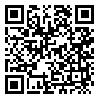Volume 32, Issue 1 (2024)
AIJH 2024, 32(1): 133-153 |
Back to browse issues page
Download citation:
BibTeX | RIS | EndNote | Medlars | ProCite | Reference Manager | RefWorks
Send citation to:



BibTeX | RIS | EndNote | Medlars | ProCite | Reference Manager | RefWorks
Send citation to:
Safayi sangari A, Mohammadnia M. Analysis and investigation of ironic tricks in Hariri officials. AIJH 2024; 32 (1) :133-153
URL: http://aijh.modares.ac.ir/article-31-63572-en.html
URL: http://aijh.modares.ac.ir/article-31-63572-en.html
1- Professor of the Department of Persian Language and Literature, Gilan University , Safayi.ali@guilan.ac.ir
2- Ph.D. student, Department of Persian Language and Literature, Gilan University
2- Ph.D. student, Department of Persian Language and Literature, Gilan University
Abstract: (14 Views)
Irony is a rhetorical tool. This technique brings to the fore esoteric concepts and the author's intent, while also providing literary pleasure for the audience. Hariri used it to add depth to his stories and create variety in his prose. we are faced with various methods and contexts of irony in the authorities, which have been manifested in words, in the way of presentation and the status of the characters, and have helped the author in indirect expression and use of this industry. This research uses a descriptive-analytical method based on library sources to determine how the ironic structure of the authorities is consistent with the definitions of irony and how is the construction and processing of irony in the authorities? For this purpose, while examining the authorities, examples of irony have been selected, and then the author's methods on how to make and use irony have been analyzed. The aim of this research was to explain Hariri's intention of using irony in diversifying the narratives of the authorities and to avoid being too transparent, by means of changing the location of events, using diverse techniques, improvisation, and literary embellishments. The results of this research show that in the categories of irony, the four ironies of verbal, situational, dramatic and Socratic irony are more prominent in officials and are considered in this research. Hariri used irony in his work to avoid repetition and to prevent the boredom of the audience, in order to diversify the authorities and criticize societal realities with his ironic language and pleasant innovations, while also demonstrating literary prowess.
Article Type: Qualitative Research |
Subject:
Arts and Humanities (General)
Received: 2022/08/15 | Accepted: 2023/02/27 | Published: 2025/06/20
Received: 2022/08/15 | Accepted: 2023/02/27 | Published: 2025/06/20
Send email to the article author
| Rights and permissions | |
 |
This work is licensed under a Creative Commons Attribution-NonCommercial 4.0 International License. |







